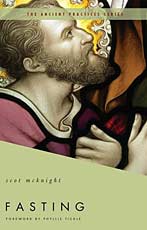"Fasting is the natural, inevitable response to a grievous sacred moment in life," writes Scot McKnight, an Anabaptist theologian and the Karl A. Olsson Professor of Religious Studies at North Park University. He is the author of more than 25 books and an authority in historical Jesus studies. This volume is the fourth in the Ancient Practices Series released by Thomas Nelson and edited by Phyllis Tickle.
After presenting a brief survey of statements about fasting (body talk) from the days of King David until the present, McKnight makes the following observation:
"I have come to this conclusion about fasting: when the grievous sacred moment is neglected and instead we focus on the results, fasting becomes a manipulative device instead of a genuine, Christian spiritual discipline. Far too much conversation today about fasting is about what we can get and not enough about the serious and severe sacred moments that prompt fasting."
This perception about fasting makes it one of the most misunderstood spiritual disciplines. One reason for it can be traced to four common images that come to mind when Christians think or talk about their bodies: as a monster to be conquered, as a celebrity to be glorified, as a cornucopia to be filled, or as a wallflower to be ignored. A much better approach is to admit the sacredness of the body and see as a vehicle through which God can work.
Fasting in the Bible, according to the author, is in response to some grievous event in life — like death or the realization of sin or when the nation is threatened. In the Christian tradition of fasting there are three kinds: a water fast, a partial food fast, and an absolute fast. McKnight would like to see more believers try this spiritual discipline as a natural response to the sacred moment of sin, repentance, conversion, and the healing graces of forgiveness.
In other chapters, the author examines fasting along with our prayer requests; disciplinary fasting; restoring stationary fasting to the church calendar; self-impoverishment as a response to the impoverishment of others; connecting the fasting of Moses, Elijah, Daniel, Jesus, and Paul with their intimate encounters with God; and fasting as body hope.
McKnight moves on to examine both the problems and the benefits of this ancient spiritual practice. Under the first umbrella, he writes about the dangers of trying to manipulate God; cheating and legalism; petty casuistry; hypocrisy; trying to get attention; meritoriousness; and extremism. He sees the benefits of fasting as intimacy with God, as freedom from bad habits, as an aid to spiritual discernment, and as a means of empathizing with the plight of the poor and those suffering injustices. He concludes:
"Fasting is what happens to the unified person who encounters a moment so sacred — a death, a consciousness of sin, a need to stand before God in prayer, a desire for holiness and love — that the person simply can't eat — the moment is too sacred to indulge in food or pleasure. Our bodies need foods and fuels to survive; it is our responsibility to recognize this. We are to live before God, ourselves, and others in a way that knows the difference between the sacredness of eating and the sacredness of fasting."
